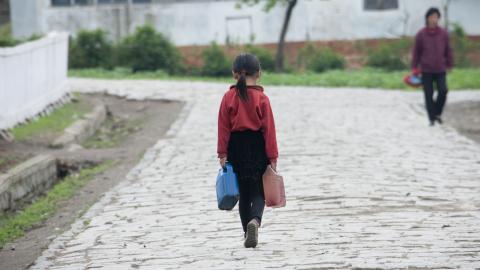October 18th marked 20 years since the North Korean Human Rights Act (NKHRA) was signed into law. The NKHRA is landmark legislation demonstrating U.S. commitment to defend the rights of the North Korean people even and especially when the Kim regime does not. At the time of the anniversary, however, the act has lapsed and is not currently included in the National Defense Authorization Act – the bill’s best chance for reauthorization. This lapse is unacceptable given the gravity of human rights conditions in North Korea.
Passed in 2004, the legislation created the Special Envoy for North Korean Human Rights Issues, a Senate confirmed position of ambassador rank tasked with prioritizing the human rights issues in broader U.S. diplomacy with North Korea. It also created a pathway for North Koreans to be resettled as refugees in the U.S. and regularly funded important work related to improving information access in North Korea. The current reauthorization bill would prioritize relief for divided families and maintains many of the elements of the previous NKHRA reauthorizations.
The Act lapsed in September 2022, meaning that if it is not passed this year, the NKHRA will fail to be reauthorized for three congressional calendar years. This leaves the North Korean people in the lurch. Since the act lapsed, the North Korean people have faced severe suffering due to the airtight restrictions the Kim regime put on the North Korean border during the pandemic. As we speak, the United Nations is undertaking efforts to document severe human rights conditions in the country over the past ten years since the UN Commission of Inquiry determined that the North Korean people face ongoing crimes against humanity in 2014. This important update is slated to be released in September 2025.
As it stands, Senator Rand Paul (R-KY) currently has a hold on the legislation; it not clear what his objections are to the reauthorization and his staff did not respond to my request for comment. Given a lack of congressional leadership, now may be an opportune moment for the executive branch to undertake substantial action.
To commemorate the 20th anniversary of the NKHRA, the U.S. Secretary of State should issue a U.S. government atrocity determination stating explicitly whether the North Korean people face ongoing crimes against humanity. It should also consider whether North Korean people face other atrocity crimes, including genocide.
My own research at Hudson Institute suggests that some groups of individuals in North Korea may face ongoing genocide today – especially North Korean Christians. Christians today face severe forms of persecution, including at least three of the five acts described as genocide in the United Nations Convention on the Prevention and Punishment of the Crime of Genocide. Specifically, North Korean Christians endure serious bodily or mental harm, killing, and targeting of their children through severe public executions for their faith, being sent to political prison camps, and the targeting of their children through the Kim regime’s brutality. To meet the definition of genocide, only one of the acts needs to be committed.
If an atrocity determination were made, it has the potential to spark other actions, including congressional action to reauthorize the NKHRA. This was certainly the case with the Uyghur atrocity determination which led Congress to pass seminal Uyghur Forced Labor Prevention Act legislation mere months after the determination.
There is a need for genuine and sustained leadership from Congress and the executive branch. Now is a critical moment to act. The question remains: Will the U.S. rise to the occasion and help the North Korean people in their time of need?
Enjoyed this article? Subscribe to Hudson’s newsletters to stay up to date with our latest content.

















